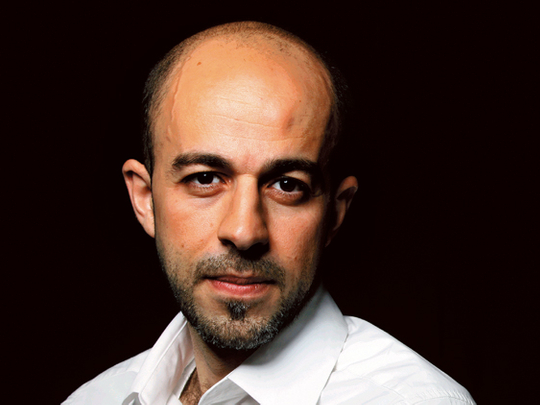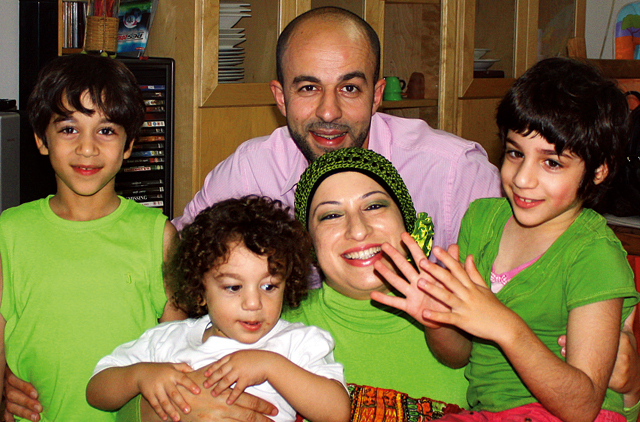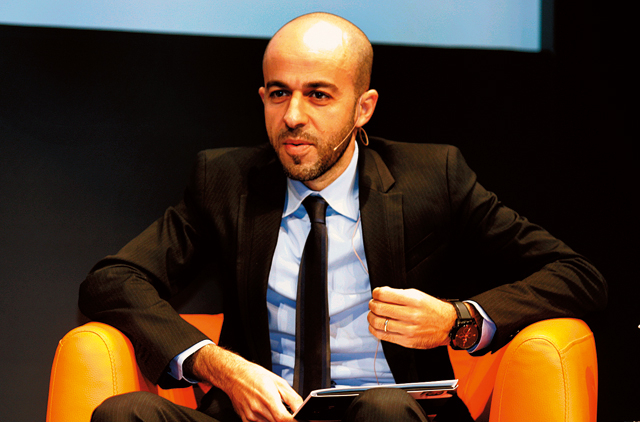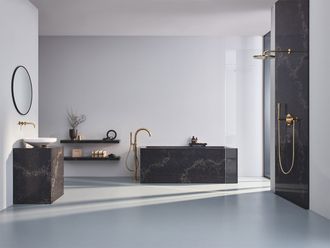
Osama Samrah, director of the Sharjah Media Centre, is a man of many talents. He's been, at various times, a newspaper columnist and reporter, a producer in television and radio, and head of a newspaper bureau, before he joined Sharjah Commerce Tourism and Development Authority (SCTDA) in 2004.
A restless soul - "I only sleep five hours, and with one eye open because I am thinking about work!" - Osama took up the SCTDA role because "the challenge here was different. I moved from producing stories to promoting Sharjah," says the 39-year-old. In the six years he has been at SCTDA, the Palestinian says he has learnt what it is to be on the other side of the fence, dealing with the media, both local and international.
His big moment came when he was asked to establish the Sharjah Media Centre. Joining the centre on January 1, 2011, he helped build it from scratch, establishing offices in Germany, Switzerland, Russia and Ukraine. His goal was simple: "To establish Sharjah as the cultural capital of the Arab world."
But this hard-sell man has a soft centre. A team player, he enjoys nurturing his staff and building them up as leaders. And, a dedicated family man, his one dream is "to see my special needs daughter, Jana, walk."
Work
After earning a degree in business administration, I started my career in marketing, but slowly drifted into the media, writing columns for several newspapers. I moved to the UAE and became involved in producing television and radio programmes on a freelance basis. I even launched a construction magazine, Tanmyat, here.
But today, for me, work means the Sharjah Media Centre. I am consumed by the need to make it a huge success.
About two and a half years ago, while working with Sharjah Commerce and Tourism Development Authority (SCTDA), I was asked to set up a media centre and press club in Sharjah. I was ready for it. We conducted a feasibility study, which was presented to His Highness Dr Shaikh Sultan Bin Mohammad Al Qasimi, Supreme Council Member and Ruler of Sharjah, who supported the idea and made this dream come true. To this end, a decree was passed a year ago to establish the Sharjah Media Centre, appointing me as the director.
It's been a real challenge. I was involved with just about everything - from the choice of paint to the carpets, furniture, as well as planning the agenda. When we started recruiting staff I went to the Mass Communication departments of the University of Sharjah and the American University of Sharjah to scout for talent. We started with a team of six people, all fresh graduates, all Emiratis. Now we are a team of 20 people, 85 per cent of whom are Emiratis.
We started work in May 2011. Media and public relations professionals from the private sector can become members, as can media students. Academics in media studies are also welcome.
The main reason for establishing the centre is to promote Sharjah, to build bridges between the media and government officials and also to make it easier for members of the media to get the right information.
The aim is also to establish Sharjah on the world map, as it should be, because we believe that there's a lot that happens in Sharjah that's not highlighted in the media. That's why we published a small book called The 30 Must-Know Facts About Sharjah at the 30th Sharjah International Book Fair last year. There was tremendous demand for this book, people just loved it. It doesn't have too much text, just facts. For instance, Sharjah has 22 museums and more than 682 mosques; it has 19 industrial areas; it established the first school as well as airport in the Gulf region and it was the first emirate that educated its women. Most people don't know these facts.
We are building relations with the media, not only locally, but also internationally. We've established offices in Germany, Austria, Switzerland, Moscow and Kiev.
We participated in the World Travel Market held in London last year. We were also the official sponsors of the London World Travel Market Guide - a big step for us as we only started operations last year. And we recently participated in the international tourism trade fair, Fitur, in Madrid, sponsored the Sharjah Water Festival, and also the Formula One Powerboat World Championship, which was held in Sharjah last December.
We had our first big event, the Government Communication Forum (GCF), on February 25 - an event to develop government communication mechanisms in the region and offer a new direction to government communication.
I believe in teamwork, which necessarily makes me one of the team. I am the director of the centre only when I need to put on that cap, to take a decision. Most of the time I am one of the team.
Some days I step into my office and go directly to the media department. I have a coffee with the team and spend a couple of hours offering them support and guidance, teaching them the ropes.
I am not a person who just sits at a desk and commands. Unless I am working on something, or writing an article, you won't find me in my office for more than 15 minutes. You'll see me in the media centre.
For me as a leader, every day is a new day. Today I may need to be tough because the situation warrants that. Tomorrow I might have to be supportive. On other days things may be going fine so there's no need to create issues just to remind everybody you're the boss. If you choose your team carefully you don't need to hold their hand all the time. I teach them to lead, to become leaders. When they come to me with different proposals, I ask them to pitch each one to me, and also to choose the one they favour. There may be occasions when I prefer the other one, but I'll tell them to go ahead with their choice. That teaches them responsibility. Most of the time it works.
I am a 24-hour person always on the go. I don't like holidays. They bore me unless I am out with my family. I sleep for only five hours and can never drop off to sleep immediately as I keep mulling over my work, probably because I love it so much.
I regret not getting into journalism full-time earlier in my career. At some point, after I've achieved all I can at this job, I'd like to go back and edit a newspaper. I miss writing a lot. I skim through most newspapers every day - I believe the more you read, the more you know.
I've lived in this country for more than 20 years and feel that I belong to this place.
Play
I had a very interesting childhood. My father, Mohammad Samrah, was an ambassador with the Palestinian National Authority, so we travelled a lot. I went to nursery school in Guinea in West Africa; Grade one in Djibouti, Grade two in Senegal, Grade three in Damascus... The first language I learnt was French - I was born in the French Hospital in Damascus, but I grew up in African countries where French was spoken. After Grade three, we moved to Kuwait for seven years, before shifting to Saudi Arabia and finally to the UAE in 1990.
I've been in war zones in Lebanon and experienced a lot as a child. It enriched my life. This is what pushed me to start writing what I hope becomes a book of my experiences.
Since my school-days, I've hated wasting time. I've always done all that I could do in my waking hours - study, play football and basketball, go out with friends, or to a movie. My father was the definitive influence on me. He was very tough when it came to values, but also very generous and kind.
My life changed radically when I became a father because I have a special needs child. My daughter suffers from cerebral palsy. She was born premature at five and a half months and weighed 690 grams at birth. Jana was not expected to survive, but she did. She was in the incubator for two and a half months. My wife, Jinan, and I used to read the Quran to her every day. After we went home, I would carry her at night and tell her stories until she fell asleep. I believe she used to understand them. I still tell her the same stories.
She's now eight. She's very emotional, just like me. She loves music and knows hundreds of songs. She communicates well, and knows what's happening around her. Sometimes she suffers terrible seizures, so bad that it makes you cry. But when I look at the way she copes I feel very happy. We've been blessed by her presence in our lives. I always look at people who are less fortunate than we are and count my blessings.
We have two more children, Walid, seven, and Abdulla, three, but we don't feel that Jana is different. She's always with us wherever we go. The only difference is she needs a little help.
Even at this age the boys sense they should take care of her. They do it instinctively, and I thank God every day for giving me such a happy family. My wife is very understanding, and puts up with my long absences from home when I am travelling with work.
I relax by reading a book or watching a movie. I am a ‘shopaholic' too - my wife's biggest issue with me. Most of it is for the family, rarely for me. I only shop for sporting gear. A T-shirt signed by Wayne Rooney or an autographed photograph of Sir Alex Ferguson are my indulgences. I still play football every Tuesday in Dubai with old friends.
There's a picture in my house taken in Kuwait in 1983 - my parents, my three sisters, my younger brother and me. It's a picture that I found after a long search - that's one possession I would save if there was a fire in my house. My BlackBerry would come second!
Dream
My dream when I was a child was to be a football player. I used to love Maradona. When I grew up and started going with my father to his newspaper office, I wanted to be a journalist or an author.
Now, my dream is to see Sharjah high on the world tourism map. And I will do everything in my power to achieve that. My dream is also to establish a smooth functioning between the media and the government sector in Sharjah, which will enhance the image of the emirate.
On a personal level, my dream is to see my Jana walking. Because if she can walk, then she can take care of herself.














